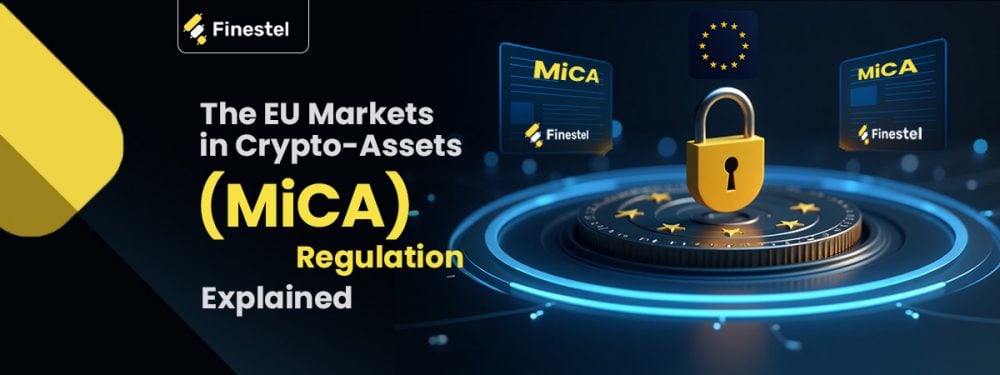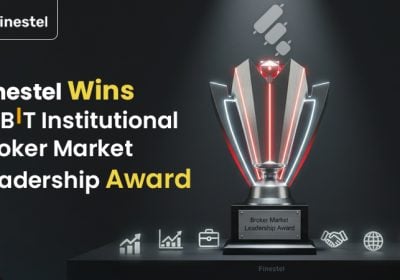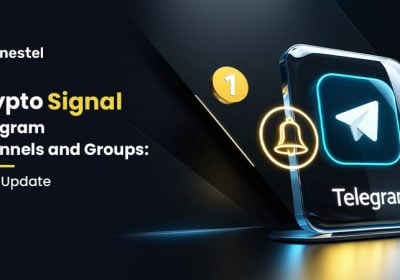So, if you’re running a crypto business in Europe, or planning to do so, you’ve probably heard about MiCA regulation. It’s a new regulatory framework for the European Union to monitor crypto businesses and operations.
Not all companies need a MiCA license, but most do. So, ignoring it could be a mistake. In this article, I’ll provide a MiCA regulation summary. You’ll understand what MiCA regulation actually is, who it applies to, and what it means for your business.
What Is MiCA Regulation?
MiCA regulation is a law created by the EU, which stands for Markets in Crypto assets. It’s a set of rules for crypto companies that operate in Europe. Its initial approval goes back to 2023, and its implementation began in 2024.

The whole purpose of this framework is to bring order to the crypto market in Europe, just like what the VARA license aims to do in Dubai.
As we all know, the EU is trying to harmonize almost everything among European countries. Before MiCA, every EU country had its own set of crypto rules. Yet, things have now changed.
There’s a good reason they created MiCA regulation. Before, when each country had its own crypto laws, with some imposing very strict rules, it was hard for some companies to expand to the whole continent. It’s quite costly to try and adapt your business model for every country. Now, this isn’t the case anymore.
But also, MiCA doesn’t cover everything. It doesn’t fully include stuff like DeFi or NFTs. At least not yet. Those areas are still a bit unclear. And, of course, some projects might fall outside the law, depending on how they’re set up.
Meanwhile, keep in mind that MiCA regulation is not a ban. It’s not trying to stop crypto. The EU just aims to set some basic standards for crypto businesses in Europe, as they definitely should.
Who Needs a MiCA License?
Now, do you need a MiCA license? The answer depends on what you do. MiCA in Europe doesn’t apply to everyone in crypto. It’s for businesses that offer specific services to people in the EU.
These businesses are called Crypto Asset Service Providers or CASPs. If you provide one or more of certain services, you’re seen as a CASP, and MiCA applies to you.
Here’s what counts as a CASP:
- Holding crypto on behalf of users
- Running a crypto trading platform
- Exchanging crypto for fiat or other crypto
- Executing client orders
- Giving investment advice on crypto
- Managing crypto portfolios for others
- Offering crypto custody or wallet services
If your business does any of these things for people in the EU, even if you’re based outside the EU, you probably need a MiCA license.
Do Traders in the EU Need MiCA?
Now here’s where it gets tricky. If you’re a regular trader using your own money, you don’t need a license. And yes, that includes professionals and high-net-worth traders too. As long as you’re not managing other people’s assets or running a business around it, you don’t need a CASP license.
But if you trade or manage funds for clients, you’re in the regulated territory. Even if you’re using a shared wallet, a bot, or a group strategy. And also, if you offer paid advice, or help others decide what to buy or sell, you need a MiCA license.
MiCA Regulation for Asset Managers
For non-custodial asset managers, it depends. If users always stay in control of their funds, and your platform never touches their crypto, you might avoid the license. But if you’re giving advice or managing portfolios on their behalf, even through APIs or smart contracts, you may still fall under MiCA in Europe.
For example, our clients at Finestel who use our white-label copy trading solution to run copy trading services for investors inside the EU must be licensed as CASPs under MiCA regulation. Offering copy trading as a paid or commercial service counts as portfolio management. And that requires authorization.
How Much Does MiCA License Cost?

Getting licensed under MiCA in Europe comes with real costs. You’ll need enough capital, the right paperwork, and a strong compliance setup. Let’s have a quick look:
|
Item |
Estimated Cost |
Notes |
|
Starting capital |
€125,000 to €730,000 |
Depends on the service you offer |
|
Legal and consulting fees |
€50,000 to €200,000 |
Includes application preparation, legal opinions, compliance setup, etc. |
|
National authority application fee |
€10,000 to €50,000 |
Depends on the EU country |
|
Ongoing compliance operations |
€100,000+ per year |
AML, audits, cybersecurity, recordkeeping |
|
Total first-year cost |
€300,000 to €1,000,000+ |
Can be lower or higher depending on service type |
So, first off, the starting capital is required by law. But the exact amount depends on your business model. Custody services and trading platforms usually need more than basic advisory services.
Legal and consulting fees are also a major part of the upfront cost. You’ll need to explain your governance model and submit a full application. Most companies hire legal firms to help with this, and this is an added cost.
Moreover, your local regulator in the EU will also charge an application fee. This depends on the country. Some are lower, others are much higher. So, there’s no single number across Europe.
Now, once you’re approved, you’ll need to maintain your systems. By systems, I mean anti-money laundering processes, security audits, employee training, and clear recordkeeping. These are all part of staying compliant with MiCA regulation. And, spoiler alert, it’s not cheap.
So, it’s clear that MiCA license costs will vary based on a lot of different factors. But you should at least plan for a total first-year spend of €300,000, and even possibly over €1 million for more complex setups.
How to Get a MiCA/CASP License?
Applying for a MiCA license is not something you can rush. You should plan and prepare lots of documents. It takes time. And usually, most companies will need legal help to get it right. 
Before You Apply
So, before you submit the application, start by getting your internal setup in place. You’ll need a clear business plan and a breakdown of your services and how they fit under MiCa.
You’ll also need a basic compliance structure. I mean, how will your company handle AML, risk, and security? A “gap analysis” is also important. It helps you see what you still need to build.
Moreover, keep in mind that if you’re issuing tokens, you’ll need a white paper that follows MiCA’s rules.
Now, this is the pre-application stage. It can take a few weeks or even months, depending on your team.
What Your Application Must Include
Once you’re ready, you apply through your local financial regulator in the EU. Here’s a checklist of what your application must include:
- Your company’s organizational structure
- Proof that you meet the capital requirement
- Details on how you handle cybersecurity and IT risks
- Anti-money laundering (AML) policies
- Governance plans (who makes decisions and how)
You should also specify how you handle conflicts of interest and the process for dealing with user complaints.
Note that each regulator might ask for extra documents. Some are stricter than others. Just keep this in mind.
How Long Does Getting a MiCA License Take?
Getting everything ready will obviously take time. Most companies need around 12 weeks just to prepare the full application. That includes writing the documents, building the compliance framework, and getting legal reviews.
Once you apply, the regulator will first check if it’s complete. That part usually takes a few weeks. Also, if something is missing, they’ll ask you to fix it before moving forward.
The full review process can take three to six months or more. Regulators might come back with questions asking for extra details. They might even schedule interviews with your team. The reason behind it is to make sure your systems work and your business is ready.
Now, there’s no guaranteed timeline. Some countries are faster than others. But in most cases, you should expect the full process (from planning to final approval) to take six to nine months.
MiCA Regulation Transitional Rules
So, what if your business already has AML registration as a VASP (Virtual Asset Service Provider)?
Well, you can keep operating until December 2025, and in some countries, this can be extended by 12 to 18 more months. But you’ll still need to apply and meet the full MiCA requirements before that deadline.
Who Can Help You Get a MiCA License?
Most crypto businesses will not get through the MiCA process on their own. You’ll likely need legal support. That means choosing a law firm or consultancy that understands the regulation, and of course, knows how to deal with EU regulators.
A firm that can help you is fscom. It offers full MiCA license support and handles the entire process. fscom structures your application and deals with regulators. The cost usually starts around €50,000 and goes up based on the complexity of your business.
Global Law Experts is another firm that works with crypto businesses on MiCA and CASP licensing. They help with business setup and long-term compliance.
Some other large firms like Hogan Lovells, Deloitte, and Dechert also offer detailed regulatory advice. But these are better suited for larger companies or businesses launching stablecoins or asset-backed tokens.
How to Avoid The MiCA Regulation?
You can stay outside of MiCA if they’re careful about how you operate. The key is to not offer regulated services.
If you don’t hold or control user funds, you’re in a better position. For example, if users keep full control of their wallets and no one else can access their crypto, then you’re not providing custody. MiCA only applies if you take control of assets or manage them on someone’s behalf.
Avoiding portfolio management or investment advice also helps. If your product is just a tool and you don’t guide users on what to trade, then it’s less likely to fall under MiCA. But once you start influencing investment decisions or trading for others, you’re in regulated territory.
Another thing to consider is where your clients come from. If your business is outside the EU and you don’t promote or advertise to EU residents, you may fall under something called the “reverse solicitation” exemption. That means a user has to come to you on their own, without you targeting them. But this is risky. Even passive marketing can count as solicitation, so it’s not something to rely on without legal advice.
The safest approach is to keep your service non-custodial, avoid giving investment guidance, and stay away from EU-focused marketing. If you stick to those limits, you might not need a license. But as your business grows, things can change.
Conclusion
MiCA regulation is changing the rules for crypto businesses in Europe. If you manage assets, offer trading services, or hold user funds, you’ll likely need a license. And getting that license takes time and money (lots of both).
But not every business needs one. If your setup avoids custody, investment advice, and EU marketing, you may stay out of scope for now. Still, this won’t last forever. As the market matures, more services will fall under regulation. Ignoring MiCA isn’t an option.







I appreciate how MiCA aims to harmonize regulations across the EU, but it might be tough for smaller crypto businesses to meet all the requirements. It’ll be interesting to see how the EU balances thorough regulation with fostering innovation in the industry.